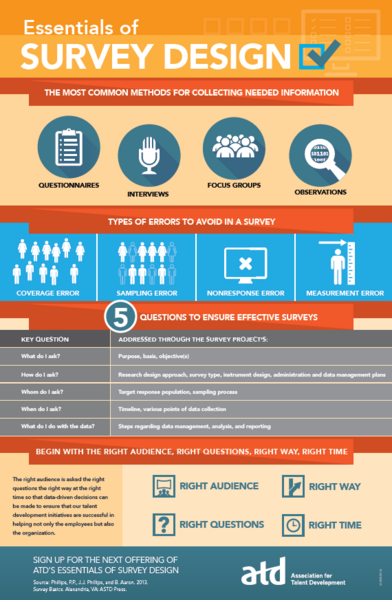ATD Blog
Perfecting Your Survey Design
Tue Mar 15 2016


Are you setting out to conduct a needs analysis before developing or revising a program? Looking to evaluate a program being offered in your organization? Seeking to understand the satisfaction or needs of your organization’s employees?
If you answered yes to at least one of these questions, there is a good chance your project will entail a survey. Indeed, whether you’re conducting a comprehensive needs assessment or evaluating a learning event, the need for data often leads to the use of surveys.
A good way to ensure effective survey design is to know the answers to five simple questions:
What do I ask? Purpose, basis, objective(s)
How do I ask? Research design approach, survey type, instrument design, administration and data management plans
Whom do I ask? Target response population, sampling process
When do I ask? Timeline, various points of data collection
What do I do with the data? Steps regarding data management, analysis, and reporting
Sounds simple, right? Just ask the right questions to the right audience, delivered the right way at the right time.
Not so fast. This simple formula opens a new set of questions. What type of survey? Multiple-choice, ranking, or rating questionnaire? Should we add interviews? What about focus groups? Also, before you embark on initiating a survey to gather data, you need to be ready for potential pitfalls, like sampling errors or failure to garner enough responses.
No doubt, there are many considerations to keep in mind when designing an effective survey. This infographic can help you gather information from others using surveys. If you need more guidance, check out the ATD Press book Survey Basics: A Guide to Developing Surveys and Questionnaires for advice on how to design an instrument so that people find it easy to respond.
You've Reached ATD Member-only Content
Become an ATD member to continue
Already a member?Sign In
